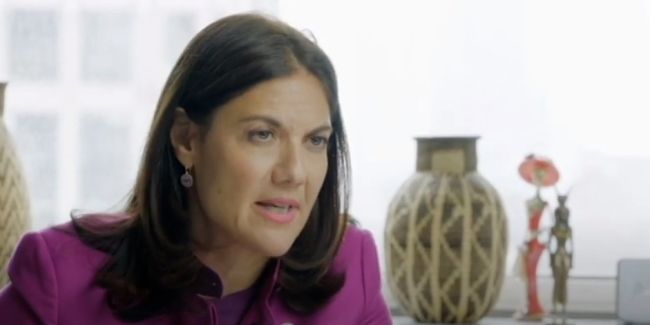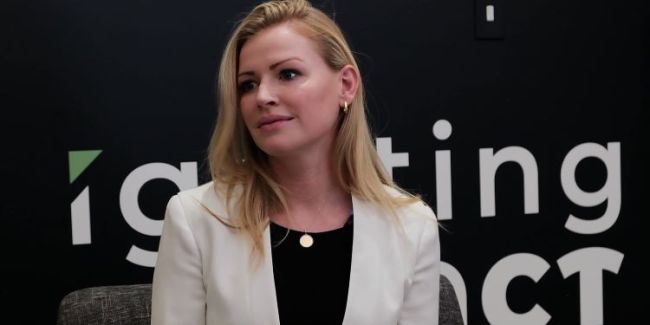According to your data, 1,7 billion adults are financially excluded. Why does financial inclusion matter?
Mary Ellen Iskenderian: We know that a focus on women is the only way to close the global financial inclusion gap. At Women’s World Banking, we see financial inclusion as a means to an end for women’s empowerment in all senses. Financial inclusion means that people and businesses have access to the affordable financial products and services they need – including transactions, payments, savings, credit, insurance, and access to digital financial tools. When women are economically empowered, they’re able to change their circumstances and have agency over their lives. They gain status in their communities, they’re able to escape abuse, they can start businesses, and they invest in their families to provide better nutrition and education, creating a ripple effect of intergenerational impact.
Colleen Ebbitt: Strong and resilient households, communities and economies are built on the foundation of sound financial health, yet there remain gaps in equitable access to relevant resources and tools to help save money or decrease debt leaving more than 1 billion people around the globe struggling to manage their financial lives. Our five-year 125 million dollar philanthropic commitment works to improve financial health globally. As a firm, J.P. Morgan has long focused on the empowerment and advancement of underserved individuals and households and we are committed to helping them to be more confident about their financial futures.
Who is most affected by financial exclusion?
Mary Ellen Iskenderian:Financial exclusion most often impacts women – particularly lower income women, and women of color. There are several overlapping factors contributing to this, from sexism and racism to political unrest to an unwillingness to modernize or let go of traditional gender roles in relation to money.You claim that the gender gap hasn’t budged in recent years. What are the reasons for this?
Mary Ellen Iskenderian:Despite advances for women in the last 40 years, the gender gap in financial inclusion stands at a global average of 9 percent and is even larger in some countries. The Covid-19 pandemic threatens to undo much progress made over the last few decades, amplifying the financial and economic struggles that low-income women face. Although there have been some recent opportunities. Soon after Covid hit, India made its relief payments payable only to women and only through a digital bank account. As a result, 25 million new accounts were opened in a matter of weeks, mostly for women to receive emergency Covid relief. These new accounts also represent new connections for women to the economy through bank accounts which will outlast the pandemic.What are the effects on the economy?
Mary Ellen Iskenderian: Excluding people from the financial system is a drag on the system, holding everyone back. There is a 700 billion dollar annual revenue opportunity for banks and other financial service providers if they do nothing more than provide financial services to women at the same rate they are provided to men. Furthermore, $12 trillion could be added to global annual GDP by 2025, according to estimates by McKinsey.The war in Ukraine is resetting priorities on a number of issues. How does the war impact your philanthropic work?
Mary Ellen Iskenderian:The war in Ukraine is a current, immediate, and highly visible tragedy, and understandably many governments and funders are repurposing their budgets toward relief for the millions of displaced people coming out of that war. However, around 4 million of those people are women and children, who are leaving as the men stay to fight. They are leaving quickly, with few possessions and without financial safety nets. They are vulnerable, often without the means to access accounts, or use mobile networks, and are being preyed upon by criminal trafficking gangs looking to exploit their vulnerability. So our work to support women in developing safety nets is as relevant there as it is anywhere else, and we are actually in the middle of conducting on the ground research, speaking to these women in Bulgaria and other destination countries about their financial journeys, and how they are coping.
Colleen Ebbitt: Our commitment will support a number of organizations working to provide emergency food, housing and medical services to those in need including International Medical Corps, International Rescue Committee, Polska Akcja Humanitarna, United States Fund for UNICEF, and World Central Kitchen. As the conflict in Ukraine continues, a growing population has been left without access to basic needs and over 5 million people have fled their homes in Ukraine. To help address changing needs in the region, J.P. Morgan has committed $10 million.
Is it getting harder to raise awareness or even money?
Mary Ellen Iskenderian: Yes. When there are global crises such as Covid-19 and the war in the Ukraine, donors’ attention can be understandably drawn to responding to those crises. We benefit from funding from several European governments; some of their Development budgets are being diverted to both humanitarian aid and military spending. Our work is part of the longer-term solution to women’s ability to weather these crises and build resiliency, but it can be hard to raise awareness and money for these longer-term solutions when the acute need is so strong.
Are women in western societies also affected by this phenomenon?
Colleen Ebbitt: Yes absolutely, people around the globe are financially excluded and this has been exacerbated by the pandemic. J.P. Morgan conducted research before the pandemic which showed: More than 1 in 5 Americans are not saving on a monthly basis and 52% of Americans do not have enough money saved or on hand for a $500 emergency.
Mary Ellen Iskenderian: There are inequities in women’s economic participation in western societies also, as women are found to be disproportionately affected by the pandemic. For this reason, women need to be prioritized in policy and economic infrastructures, including efforts to support women’s financial resilience as they are impacted by and recover from Covid-19 and the associated economic challenges. Depending on the cultural context, country, available infrastructure and resources, there are numerous solutions that may be considered to remove barriers to digital financial inclusion of women.



